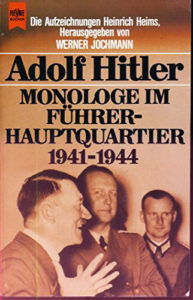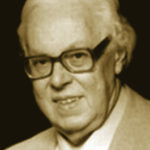Chapter 10
Hitlerian esotericism & the tradition
‘The fools scorn Me when I take on human form;
My essence, supreme source of beings, escapes them.’
—Bhagavad-Gita, 9, verse 2
There were, of course, echelons among the elect. Curiously, the name of this elite of physical health and beauty, of warlike courage and, more or less, of secret knowledge, whose initials are known only to the vast public, means, as I said above, ‘echelons of protection’.
I believe I also mentioned this about the Ordensburgen (Order Castles), in which the military training, political and, to some extent, metaphysical education of the SS, and especially of its cadres, took place because Hitler’s Weltanschauung is inseparable from the metaphysics that underlies it. This is so true that a critic of National Socialism and René Guénon’s work could say that the latter was ‘Hitlerism minus the armoured divisions’,[1] and this without the Cairo insider ever having written a word about ‘politics’.
Not all the candidates—I should say ‘novices’—of the SS were trained and educated in the same Ordensburg. And not everyone in the same Ordensburg was taught the same way, especially in the higher echelons. It depended on the tasks for which they were considered suitable within the elite itself.
For the elite consisted of several organisations, from the most visible, Waffen (Armed) SS—the most famous one too, because of the superhuman heroism it demonstrated so many times during the Second World War—to the most secret one, the Ahnenerbe (Heritage of the Ancestors), founded in 1935, and all the more difficult to know because many of its documents (also secret, it goes without saying) were destroyed ‘before the arrival of the Allies in Germany’, and because ‘the members of this organisation who survived the collapse of the Third Reich… remain silent with a strange resolution’.[2]
It is at least logical to think that it was probably the Ahnenerbe which, in Adolf Hitler’s ‘Black Order’, was the repository of Tradition—and more particularly, certain sections of the Ahnenerbe, for it included many, including fifty-two scientific sections[3] dealing with research, although not necessarily in the spirit and with the methods used in the experimental sciences. According to Wolfram Sievers’ statements before the victors’ tribunal in Nuremberg, to which we owe this precision, the same Institute ‘carried out or commissioned more than one hundred large-scale research missions’.[4]
The nature of some of these investigations reveals a clear interest in esoteric matters. Thus, the symbolism of the harp in Ireland was studied, as well as the question of the survival of true Rosicrucians: in other words, of initiatory groups still possessing the integral tradition of the Knights Templar (from which the first Rosicrucians are said to have inherited). Thus, the Bible and the Kabbalah were reconsidered, trying to derive their hidden meaning; asking, in particular, what role the symbolism of numbers might play in both. It was in this way that the physical and mental structure of human specimens of different races was studied—that of the Nordics, with the special care that one can guess—to ensure that the concept of heredity and race, so fundamental in Hitlerism, was given its full value. Thus, systematic and sustained efforts were made in all research aimed at revealing to the Germans the glory of their own historical or pre-historical antiquity, their Middle Ages, and at highlighting the importance of the corresponding sites.
Without denying that there is a part of esoteric truth in Christianity and Judaism itself, and in all religions or philosophies that are closely or even distantly related to Tradition, the emphasis was on the traditional form of the Germanic peoples. Traces of this can be found in the symbols engraved on rock from the earliest prehistoric times and, after the bloody eradication of the cult of Wotan by Charlemagne and his immediate successors, even in certain rites practised in the Middle Ages the Chivalric Orders or the Holy Vehm. It would be interesting to know whether the latter, which has not ceased to exist as a secret organisation, has, or has had at any time, any connection with the Thule Society.
Heinrich Himmler, the head of the SS and the man whose career, so much decried outside Hitlerian circles, is marked more than any other by this detached violence that signifies a higher quality of being, albeit ‘in a veiled way’,[5] in his speech of January 1937, which contains his only public or semi-public reference to the Ahnenerbe, extols the high importance of archaeological discoveries by the Institute of that name in Altchristenburg, East Prussia: the uncovering of several layers of ancient Germanic fortifications, refuting the view that East Prussia was a Slavic land.
But there is more: he advocates the ‘restoration’ and ‘maintenance’ of cultural centres dedicated ‘to German greatness and the German past… in every region where there is an SS company’[6] and he gives examples of such centres. One is the Sachsenhain near Verden, where 4,500 boulders, each transported from a Saxon village, had been erected one after the other, on either side of the paths in the middle of the forest, in memory of the four and a half thousand Saxons who were beheaded there, on the banks of the Aller, in 782, by order of Charlemagne because they persisted in refusing to accept the foreign god he wanted to impose on them.
The other is the site of the Externsteine, impressive vertical rocks marking one of the world’s great spiritual centres near Horn, and the sacrosanct place of worship for the ancient Germans. On the top of the highest of the rocks, in place of the ancient golden Irminsul torn down in 772 by the soldiers of the same Christian conqueror, there now flew, victorious, liberating, a symbol of the reconciliation of all the opposing aspects of German history in the consciousness of its profound unity: the red, white and black swastika flag of the Third Reich.
And the examples show that it was not only a question of ‘culture’, but of knowledge, or, for the German in general, of national culture; and for the initiates of the SS Order and in particular of the Ahnenerbe, secret knowledge of the great cosmic truths, apprehended through the traditional symbolism such as the Germanic peoples knew it, and such as a silent minority has preserved it. For, and this is a point worth noting, despite the very strong ‘pagan’ current underlying Hitlerism, manifesting itself above all in the unreserved rejection of all anthropocentrism such as the whole personal God, there was never any question of rejecting or even underestimating anything in the ancestral German and European heritage which did honour to the Aryan genius.
The Führer had, says André Erissaud, ‘the feeling’—I myself would say, the certainty—that ‘everything in the most recent West that had taken the form of a religion, and the Christian religion in particular… pertains to the all too human’, and therefore had little to do with truly transcendent values and ‘offered a general climate scarcely compatible with its dispositions and vocation, situated beyond the truths and dogmas of the faith proposed to ordinary man’.[7] However, the whole of Western civilisation is at the same time ‘recent’ and ‘Christian’. We must never forget this.
That did not, however, prevent Adolf Hitler, who was impartial, as is necessary for any sage (and even more so for any human expression of the divine), from admiring Charlemagne: the Sachsenschlüchter or ‘terminator of the Saxons’, as Alfred Rosenberg, Johann von Leers, Heinrich Himmler, and a good number of other great dignitaries, thinkers and men of action of the Third Reich called him. He saw in him the conqueror with the immense will to power, and above all the first unifier of the German people; the one who, alone at that time, had had the idea of the Reich even if he had used the artificial unity of ‘faith’ to impose it, and if this ‘faith’ was the Christian faith, i.e. a foreign faith. It will be remembered that Adolf Hitler insisted on the dissolving action of Christianity on the Greco-Roman world, and that he called it ‘pre-Bolshevism’. But it does not matter what this faith was (and still is), if it was the cement of a conquering Germanic Empire and, later, the occasion for the whole flowering of art that we know. Insofar as this art is beautiful it presupposes, in any case, a certain knowledge of what is eternal. The Führer thus accepted with respect, as a German heirloom, a replica of the sword of the Emperor of West.
______ 卐 ______
Editor’s note:
I distinctly remember the first time I read Hitler’s Table Talk in an Ostara Publications edition. This was the only point on which I differed with the Führer.
 Precisely Ostara has published a book, which I own, that shows that we could rate Charlemagne—as historian Arthur Kemp Kemp, publisher of Ostara told me—within the evilest characters of European history. We recommend Thomas Hodgkin’s The Life of Charlemagne to those who have swallowed the Christian version of this man that imposed a Semitic cult on the noblest race on Earth.
Precisely Ostara has published a book, which I own, that shows that we could rate Charlemagne—as historian Arthur Kemp Kemp, publisher of Ostara told me—within the evilest characters of European history. We recommend Thomas Hodgkin’s The Life of Charlemagne to those who have swallowed the Christian version of this man that imposed a Semitic cult on the noblest race on Earth.
In a previous instalment, Savitri said that Hitler was closer to Wagner than to Nietzsche. That is quite true. If he had been closer to the philosopher than the musician, he would have realised the danger posed by the Anglo-Americans, so foolish in their Christian morality that they destroyed a miraculous revival of paganism: a 20th-century reincarnation of Charlemagne’s misdeeds!
As I have said, after I finish with Savitri’s book I’ll continue posting Deschner’s Christianity’s Criminal History. We shall see that even after the destruction of Greco-Roman culture by Christians, there were still many Germanic tribes who refused to worship the god of the Jews. Charlemagne forced these uncontaminated Nordids to worship the enemy god: a historical milestone related to the darkest hour we suffer today (see for example my post yesterday, ‘Liberalism as a heretical movement’).
____________
[1] Louis Pauwels and Jacques Bergier: Le Matin des Magiciens, ed. Gallimard, 1960, p. 326.
[2] Brissaud: Hitler et l’Ordre Noir, page 283.
[3] Ibid., page 285.
[4] Ibid.
[5] Ibid., page 283.
[6] Ibid., page 284.
[7] Ibid, page 111.







